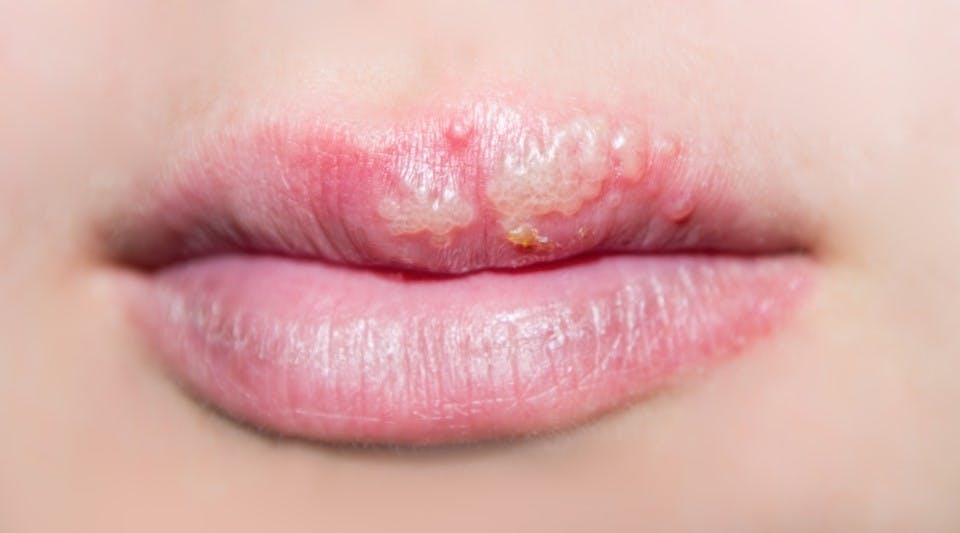Back to Dealing with Cold Sores articles


What Is the Herpes Simplex Virus (HSV)?
Herpes simplex (HSV) is a pervasive virus, with herpes simplex type 1 affecting at least two thirds of under-50s worldwide.iIt’s extremely contagious, and once you have the virus, it’s with you for life. However, most of the time there are no symptoms and some people are even unaware they have it. From ‘what is HSV’ to ‘what are the complications’, we answer some of your most common HSV questions.
What Is HSV?
HSV stands for herpes simplex virus, and there are actually two types: HSV-1 and HSV-2. HSV-1 is by far the most common, affecting as many as half of all American adults, while just one in eight Americans aged 14 to 49 are thought to have HSV-2.ii
What Does HSV Cause?
HSV-1 mainly causes cold sores – also known as oral herpes or fever blisters– while HSV-2 mainly causes genital herpes.iii
However, both types can cause both conditions. In addition, HSV-1 and HSV-2 may also cause herpetic whitlowiv – sores or blisters around your fingertips – or HSV keratitis, which is an inflammation of the cornea, the transparent layer covering the front of your eyev.
What Are the Symptoms of HSV?
You may have HSV without ever having symptoms – or they may be so mild that you don’t notice them. Most people are infected with HSV-1 as a child and the symptoms you show when first infected are often different from those in subsequent attacks.
First-time infection symptoms – usually when infected as a child – may include:v
- Small, painful blisters in the mouth or on gums or lips
- Swollen, tender lymph glands
- A fever
- A sore throat
Common recurrent symptoms are:vi
- HSV-1 on the face appears as cold sores around your mouth or on lips – A warning tingling, itching or burning sensation, followed by a red, fluid-filled blister, which then bursts and scabs.
Other symptoms of an HSV infection are:vii
- Herpetic whitlow – Red, painful, pus-filled sores or blisters around your fingertips.
- Herpetic (HSV) keratitis – Pain, redness, sensitivity to light, blurred vision, feeling of grittiness, or eyelid sores, affecting one or both eyes.
- Genital herpes – A burning, tingling or itching around your genitals, blisters or sores that burst then scab, pain on urinating and sometimes a vaginal discharge.
Why Does HSV Reoccur?
Once you have the virus, it stays in your body permanently. While some people never get symptoms, others get them up to two or three times a year. The virus is activated by certain triggers, which vary between people. Try to spot yours, so you can avoid them.
Common HSV triggers include:viii
- UV light
- Stress
- Illness
- Cold weather
- An injury to the affected area
- Hormonal changes, for instance around the time of your period
How Can You Treat HSV?
As soon as you feel that first tingling, itching or burning, apply Abreva® Cream, which can block the spread of the cold sore virus to healthy skin cells. It is clinically proven to clear up cold sores in as few as 2½ days* when applied at the first sign. However, it’s only suitable for cold sores caused by HSV-1, so if you have sores on your genitals or elsewhere, see your doctor. Abreva® cannot treat HSV-2 symptoms.
*Median healing time 4.1 days. 25% of users healed within 2½ days.
Is HSV-1 Contagious?
Both HSV-1 and HSV-2 are contagious. They are spread mainly by skin-to-skin contact, entering your body through broken skin or mucous membranes such as the moist skin of your mouth, genitals or eyes. HSV-1 is most contagious after the blister has burstix, but it can also be transmitted before it appears, from the first moment you feel a tingle, itch or burn.x
Can HSV-2 Be Transmitted By Kissing?
Unlike HSV-1, HSV-2 is rarely transmitted orally by kissing.xi Typically, HSV-2 is sexually transmitted through direct skin-to-skin contact with the genitals or sores and fluids of someone infected with the virus.xi
How to Help Stop HSV Spreading
Remember, the cold sore virus can be spread even when a person isn't showing symptoms. To avoid spreading the virus:xii
- Don’t touch the infected area, apart from when applying cream.
- Wash your hands thoroughly after touching the area.
- Be extra careful around children, babies, pregnant women, elderly people and those who may have low immunity, as HSV can cause complications.
- Don’t share items that may have come into contact with the affected area, such as toothbrushes, cutlery, cups, glasses, cold sore cream, lipsticks or lip balm.
- If you have cold sore symptoms, avoid kissing and oral sex until any cold sores have completely healed.
What Are the Complications of HSV?xiii
- Skin infections – This happens if the virus comes into contact with broken skin such as cuts or eczema.
- Neonatal herpes – If an expectant mother has genital herpes, the infection could pass to her baby and cause brain damage, blindness, or even death.
- Increased risk of contracting other STIs – Genital herpes increases your risk of contracting other STIs, as the associated blisters can cause breaks in the skin, allowing certain microbes to enter the body more easily.
- Blindness – If the infection is transferred to the eyes and spreads to the cornea, it can be sight-threatening.
See Your Doctor If:
- You’re not sure of the diagnosis.
- Your symptoms haven’t cleared up in 10 days or keep coming back.
- The infection has spread to your eye area.
- You have sores on your genitals.
- You have lowered immunity.
- You’re pregnant and you have genital herpes.
What is HSV? – Next Steps
It may be an incurable condition, but understanding what HSV-1 and HSV-2 are, their causes, how contagious they are, potential complications and how to treat them, can help you keep the condition under control and avoid spreading it to others.
Learn more about preventing cold sores and keeping your lips in great condition with our top lip care tips.
Use Abreva® Cream to treat cold sores caused by HSV-1, and find out how Abreva® Cream works.
SOURCES
i. Herpes Simplex Virus. World Health Organization. https://www.who.int/en/news-room/fact-sheets/detail/herpes-simplex-virus. Accessed 06/25/19. Referenced text is highlighted in source PDF.
ii. Does Everyone Have Herpes? And 12 Other FAQs About HSV-1 and HSV-2. Healthline. https://www.healthline.com/health/does-everyone-have-herpes. Accessed 11/11/19. Referenced text is highlighted in source PDF.
iii. Herpes Simplex Virus: HSV-1 & HSV-2. WebMD. https://www.webmd.com/genital-herpes/pain-management-herpes#1. Accessed 11/08/19. Referenced text is highlighted in source PDF.
iv. What's to Know About Herpetic Whitlow?. Medical News Today. https://www.medicalnewstoday.com/articles/317701.php. Accessed 11/08/19. Referenced text is highlighted in source PDF.
v. Cold Sores in Children: About the Herpes Simplex Virus. Healthy Children.org. https://www.healthychildren.org/English/health-issues/conditions/skin/Pages/Herpes-Simplex-Virus-Cold-Sores.aspx. Accessed 11/08/19. Referenced text is highlighted in source PDF.
vi. Cold Sores. Healthline. https://www.healthline.com/health/herpes-labialis. Accessed 11/08/19. Referenced text is highlighted in source PDF.
vii. Cold Sores (Oral Herpes, Herpes Labialis, Nongenital Herpes Simplex Infections). MedicineNet. https://www.medicinenet.com/herpes_simplex_infections_non-genital/article.htm. Accessed 11/08/19. Referenced text is highlighted in source PDF.
viii. How do I Manage a Patient with Recurrent Herpes Simplex?. JCDA by Canadian Dental Association. https://jcda.ca/article/c154. Accessed 11/08/19. Referenced text is highlighted in source PDF.
ix. About Cold Sores. NHS Inform. https://www.nhsinform.scot/illnesses-and-conditions/mouth/cold-sore. Accessed 11/08/19. Referenced text is highlighted in source PDF.
x. Cold Sores. NHS. https://www.nhs.uk/conditions/cold-sores/. Accessed 11/08/19. Referenced text is highlighted in source PDF.
xi. Can HSV2 Be Transmitted Orally? What You Need to Know About Herpes Transmission. Healthline. https://www.healthline.com/health/can-hsv2-be-transmitted-orally. Accessed 11/08/19. Referenced text is highlighted in source PDF.
xii. Cold Sore. NHS Inform. https://www.nhsinform.scot/illnesses-and-conditions/mouth/cold-sore. Accessed 11/08/19. Referenced text is highlighted in source PDF.
xiii. Can You Die from Herpes? Healthline. https://www.healthline.com/health/can-you-die-from-herpes. Accessed 11/12/19. Referenced text is highlighted in source PDF.






